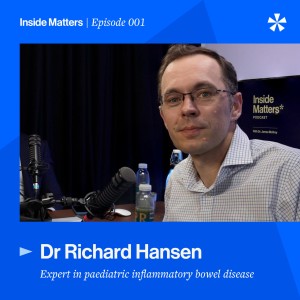Dr Hansen is a Consultant Paediatric Gastroenterologist at the Royal Hospital for Children in Glasgow and an Honorary Clinical Associate Professor at the University of Glasgow. He is a principal investigator within the Bacteria, Immunology, Gastroenterology and ‘Omics (BINGO) group at the University which developed the CD-TREAT diet for Crohn’s disease.
His clinical interests are inflammatory bowel disease (IBD), paediatric endoscopy and Helicobacter pylori. His main research interest is the gastrointestinal mucosal microbiota and its importance in paediatric disease, particularly IBD. He is especially interested in the molecular characterisation of the microbiota and its subsequent modification for the purposes of therapeutic effect via microbial therapeutics.
In this episode, we discuss treating IBD in children, using entirely liquid diets to reduce inflammation, and developing novel strategies that target the microbiome to treat IBD.
1:06 - Intro
1:56 - Interview Starts
2:27 – How to study the microbiome – analytical methods and study types
3:22 - How has microbiome science changed over the last 5 years?
5:13 - What is Exclusive Enteral Nutrition (EEN)?
7:39 - What is Inflammatory Bowel Disease (IBD)?
10:18 - Why are people getting IBD earlier in life?
14:54 - Is there different immunology between Crohn's disease and IBD?
17:07 - How has the perceived importance of the microbiome changed in IBD?
21:48 - How did all of this influence your PhD?
26:14 - Are we missing something with the current microbiome studies?
29:17 – The Bristol Stool Score
29:53 - Do you think that the microbiome drives inflammation in the gut?
34:01 – The Appendix
39:15 – Using the microbiome to predict IBD?
46:16 – Faecal microbiota transplantation (FMT)
49:03 – FMT in UC – studies published to date.
52:17 – Super donors in FMT
59:17 – The 16S gene
1:03:06 – The microbiome analytical toolkit
1:07:55 - AI and large populations
1:09:19 – The implantation of machine learning
1:10:39 - Are clinicians trained in how to use AI
1:13:01 - Discussion on the application of FMT in paediatric populations.
1:14:22 - Infants, diet and gut health.
1:18:01 – Further discussion on FMT in paediatric populations.
1:20:44 - FMT donor screening processes.
1:22:21 – Donor selection for paediatric FMT.
1:26:30 – Potential risks associated with FMT.
1:29:19 - Can FMT or other microbial therapeutics replace immune system dampening therapies?
1:31:13 - When IBD is at its worst, what is it like?
1:36:01 - What do we do about the EEN diet and Crohn’s disease?
1:38:20 - Which element of EEN is driving the positive effects in Crohn’s?
1:42:27 - How do we create a less socially restrictive diet than EEN but keep the benefits?
1:44:44 - What is the ultimate aim of CDTreat?
1:47:19 - What is the relative importance of bacteria versus other components of the microbiome?
Key takeaways from this episode:
There has been an explosion of interest in the microbiome in recent times as it is becoming it easier and easier to analyse the microbiome through analytical methods that do not involve traditional culture techniques - which are labour intensive and relatively slow.
The field of microbial therapeutics is still in its infancy. There are many ongoing clinical trials into new ideas. Richard is hopeful that these trials will result in new treatment options for patients.
Inflammatory bowel disease is a chronic (long term) condition characterised by inflammation in the gut. There are two main forms of IBD, Crohn’s disease and Ulcerative Colitis. Crohn’s disease can affect any part of the intestinal tract, from mouth to anus. UC only affects the last part of the gut - the colon.
There is a microbiome that lives within the lumen of the gut and on the surface of the intestine (mucosa). Richard’s analogy for this relationship is that they are like a beach and an ocean – they are different but inextricably linked.
The incidence (when the disease first starts) of IBD across the population seems to be occurring earlier and earlier in life. At the start of Richard’s career it was rare to see a patient below the age of five presenting to hospital with symptoms, now days it is becoming more common. The environment and its impact on the microbiome may be the key driver for this. There are clear changes that are observed in microbiome studies in patients with reduced IBD, namely: reductions in diversity (how many bacteria are there and how evenly are they spread), and increases / decreases in particular bacteria.
Exclusive internal nutrition (EEN) is a term used to describe a 6-8 week course of an entirely liquid diet. The data suggests 4 out of 5 paediatric patients suffering from Crohn’s disease enter remission (where the gut is healed and there is no active disease causing symptoms) after a course of EEN. It thought that the longer the course of EEN the more effective it is.
EEN is becoming much more popular in adult therapy, however its uptake is limited due to social constraints. Richard and a team working at the University of Glasgow are developing a less socially restrictive diet that mimics the effects of EEN. The programme of work is called CD-treat.
Intestinal microbiota transfer (IMT) involves the movement of microorganisms from one person into another with the intention of treating a disease. Six randomised controlled trials have been published in UC so far, with a definite signal towards IMT being effective. Richard is hopeful that these studies will pave the way for new treatment options in IBD.

No comments yet. Be the first to say something!